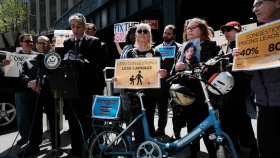- August 28th, 2023
- 0 Comments

Last month, the Federal Highway Administration approved the public release of the Metropolitan Transportation Authority's environmental assessment of its plan to toll most passenger vehicles entering commercial districts in the Manhattan borough of New York City – paving the way for its final approval. In a letter, the FHWA informed the MTA that it conditionally approved the plan after reviewing all public comments on the Central Business District Tolling Program's final environmental assessment and an analysis carried out by the MTA, NY State DOT and NYC DOT, saying "The FHWA is now poised to issue a Finding of No Significant Impact, the federal environmental approval which will allow the state to move forward with congestion pricing program design and adoption." From there, the public has 30 days to review a draft of the document.
According to SmartCitiesDive, many advocates, urban planners, and public officials in New York support the congestion pricing program, which would be the first in the U.S., pointing to evidence that similar policies in London, Stockholm and Singapore have led to reduced traffic congestion and air pollution from vehicle emissions. Revenue from the program would also help fund the MTA's $51 billion capital investment plan. That could be a boon for the agency which has faced funding shortfalls.
But the plan has also faced opposition from suburban residents and politicians in New York and New Jersey who worry that it would charge motorists up to $23 per day to enter Lower Manhattan, and place an undue financial burden on commuters, businesses, taxi and ride-hailing drivers. They're also concerned about increased traffic congestion and air pollution in the surrounding areas, as motorists try to avoid congestion fees by using different routes into the city.
Read more about the progress of this program's implementation at SmartCitiesDive.
Source: Smart Cities Dive













